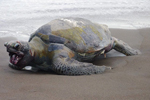The leatherback sea turtle—the world’s largest turtle and the only member of the genus Dermochelys—received good news today. In an update of the IUCN Red List, the leatherback sea turtle (Dermochelys coriacea) has been moved from Critically Endangered to Vulnerable. However, conservationists warn that the species still remains hugely endangered—and in rapid decline—in many parts of its range.
The new assessment found that the population of leatherback turtles in the northwest Atlantic Ocean (along the US and the Caribbean) is on the road to recover due to conservation actions. While scientists aren’t sure how the southeast Atlantic population (mostly in Gabon) is faring, it remains the world’s largest population.
However, the situation in the Pacific is far more bleak. The east Pacific population has dropped by 97 percent in three leatherback generations, while the west Pacific population has fell by 80 percent during the same period.
“The persistence of significant threats in all regions warrants concern for the future viability of even the largest subpopulations. Current efforts to protect Leatherbacks, their offspring, and their habitats must be maintained—or even augmented, where possible—to reverse declines in Pacific and Indian Ocean subpopulations and to sustain population growth in the Northwest Atlantic,” the assessors write.
Leatherback sea turtles face a variety of major threats, including fisheries’ bycatch, human consumption of their eggs and meat, coastal development, light pollution, plastic pollution, and climate change.

Leatherback sea turtle. Photo by: Guy Marcovaldi.
Related articles
Longline fisheries in Costa Rica hook tens of thousands of sea turtles every year

(11/14/2013) Hundreds of kilometers of commercial fishing lines slither along coastal waters in Costa Rica, hooking thousands of mahi-mahi and many other marketable fish. But when scientists scrutinized fishermen’s catch, they were shocked by the staggering number of sea turtles accidentally snagged on the lines.
Ultraviolet nets significantly reduce sea turtle bycatch
(11/11/2013) Bycatch, a side-effect of commercial fishing in which non-target species are accidentally caught, is linked to severe population declines in several species. Sea turtles are particularly impacted by small-scale coastal gillnetting practices, in which large nets are deployed and indiscriminately snag anything of a certain size that attempts to swim through them. However, that may soon change.
California celebrates its inaugural Pacific Leatherback Conservation Day with sobering reality

(10/15/2013) On an isolated beach in Bird’s Head Peninsula, Indonesia, a female leatherback turtle shuffles out of the ocean and onto the shore, ready to lay her eggs. Under the cover of night she excavates a hole in the sand, depositing anywhere from 80 to 100 eggs inside. Using her flippers she flicks sand over the eggs, hiding them from potential predators. Then, shuffling away, she returns to the turquoise waters ready to make an 8,500-mile journey across the Pacific Ocean to the California coast.
Are sea turtles responsible for lower fish catches in India?

(08/29/2013) Fishing communities on Agatti Island in Lakshwadeep, India, blame their reduced fish catch on green turtles; according to them, green turtles chomp their way through the seagrass beds lining the shallow reef waters that are essential for fish to breed. This leads some in the community to clandestinely kill sea turtles and destroy their nests.
Eighty sea turtles wash up dead on the coast of Guatemala

(08/27/2013) An assortment of marine animals and birds reside along the black volcanic sand beaches of Guatemala’s Pacific coast, but lately both residents and visitors on the southeast beaches of the country have observed a tragic event – the stranding of dead sea turtles.
Eighty dead sea turtles have been recorded since the first week of July.
Suspects arrested in Costa Rican sea turtle conservationist’s murder
(08/03/2013) Eight suspects were arrested during early-morning raids Wednesday in the murder of Costa Rican sea turtle conservationist Jairo Mora.
